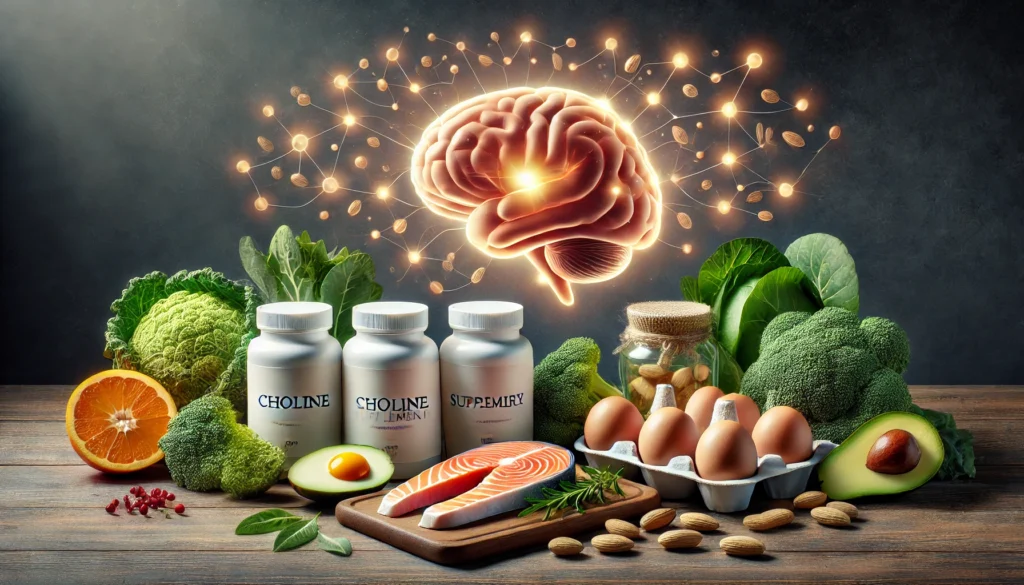Understanding Choline and Its Role in Brain Health
Choline is an essential nutrient that plays a fundamental role in numerous physiological processes, particularly in brain health and cognitive function. As a precursor to acetylcholine, a neurotransmitter crucial for memory, learning, and overall cognitive function, choline is indispensable for maintaining optimal neurological health. This nutrient also contributes to cell membrane integrity, lipid metabolism, and liver function. Despite its importance, many people do not consume adequate amounts of choline in their daily diet, making choline supplements a valuable addition to a health-conscious regimen.
You may also like: The Best Adaptogens for ADHD: How Rhodiola Rosea May Improve Focus and Reduce Stress
Choline is classified as a water-soluble compound, often grouped with the B-vitamin family due to its similar metabolic functions. Unlike other vitamins, the human body can synthesize small amounts of choline in the liver, but these quantities are insufficient to meet daily needs, necessitating dietary intake from choline-rich foods or supplements. Understanding what choline is and its benefits helps individuals make informed decisions about their nutritional choices, particularly in the context of cognitive health and memory enhancement.

Choline Benefits: Why This Nutrient Is Essential for Cognitive Function
Choline benefits extend beyond cognitive enhancement, impacting several critical physiological processes. One of the most significant benefits of choline is its role in the production of acetylcholine, a neurotransmitter responsible for signal transmission in the brain. Acetylcholine is vital for memory retention, learning ability, and neuromuscular function. Individuals with choline deficiencies often experience cognitive decline, impaired memory, and difficulty concentrating.
Beyond its cognitive effects, choline plays a role in lipid metabolism and liver function. It helps prevent fatty liver disease by facilitating the transport of lipids away from the liver, ensuring that fat metabolism occurs efficiently. Additionally, choline is essential for the development of the fetal brain and nervous system, making it a crucial nutrient for pregnant women. Research has indicated that adequate choline intake during pregnancy can enhance cognitive function in offspring and reduce the risk of neural tube defects.
Natural Sources of Choline: Foods High in Choline
For those looking to obtain choline naturally, a variety of dietary sources can help meet daily requirements. Foods high in choline include animal products such as eggs, liver, beef, and chicken, as well as plant-based options like potatoes, soybeans, and nuts. Among these, eggs are particularly notable, as they contain a significant amount of choline per serving.
Many individuals wonder, “How much choline is in eggs?” or “What foods have choline?” A single large egg contains approximately 147 mg of choline, making it one of the richest natural sources of this nutrient. The yolk is particularly high in choline, whereas egg whites contain minimal amounts. This leads to the question, “Do egg whites contain choline?” or “Do egg whites have choline?” While egg whites provide some protein, the majority of choline content is found in the yolk.
Other excellent choline foods include beef liver, which contains around 356 mg of choline per 100 grams, making it one of the highest sources available. Chicken is another valuable source, with about 72 mg of choline per 100 grams. Potatoes, particularly red and white varieties, contain small but significant amounts of choline, leading some to ask about “potato choline” as a dietary component. For vegetarians and vegans, incorporating soybeans, quinoa, and cruciferous vegetables like broccoli and Brussels sprouts can help ensure adequate choline intake.
Choline Supplements: Choosing the Best Choline Supplement for Your Needs
While dietary sources provide essential choline, supplementation can be an effective way to ensure adequate intake, particularly for individuals with increased cognitive demands or dietary restrictions. Various choline supplements exist, each with unique benefits and bioavailability.
Choline Bitartrate
Choline bitartrate is one of the most common forms of choline supplements available. It is widely used due to its affordability and accessibility. While it provides a good source of choline, its ability to increase acetylcholine levels in the brain is relatively moderate compared to other forms. Nonetheless, choline bitartrate is beneficial for general health support and those seeking an economical way to increase choline intake.
Alpha-GPC
Alpha-glycerophosphocholine (Alpha-GPC) is a highly bioavailable form of choline that efficiently crosses the blood-brain barrier. It is considered one of the best choline supplements for brain health due to its ability to enhance acetylcholine production and improve cognitive performance. Studies have shown that Alpha-GPC supplementation can enhance memory, improve focus, and support neuroprotection, making it a preferred choice among students, professionals, and aging individuals.
Citicoline (CDP-Choline)
Citicoline, also known as CDP-choline, is another highly effective choline supplement with profound cognitive benefits. It supports memory retention, enhances learning ability, and promotes overall brain health. Additionally, citicoline contributes to phospholipid synthesis, which is essential for maintaining cell membrane integrity. Research suggests that citicoline supplementation can be particularly beneficial for individuals with cognitive impairments, such as those with Alzheimer’s disease or age-related memory decline.
Choline Chloride Supplement
Choline chloride is another form of choline supplement that is often used in animal feed but is also available for human consumption. While it provides an adequate source of choline, its bioavailability is lower than that of Alpha-GPC or citicoline. Some individuals prefer choline chloride supplements for general health maintenance, but it is not typically the first choice for cognitive enhancement.
How Much Choline Should You Take?
Determining the optimal choline dosage depends on various factors, including age, gender, and individual health status. The recommended daily intake (RDI) for choline varies, with adult men requiring approximately 550 mg per day, while adult women need around 425 mg. Pregnant and breastfeeding women have higher choline needs, with recommended intakes of 450 mg and 550 mg, respectively.
Individuals often wonder, “Can I take choline at night?” or “Where to find choline supplements?” While choline can be taken at any time of the day, some people prefer to take it in the morning to maximize cognitive benefits throughout the day. Choline supplements can be found in health stores, online retailers, and pharmacies. Those searching for “where to get choline” or “where can I get choline” can explore reputable supplement brands that provide high-quality choline products.

Frequently Asked Questions (FAQ) About Choline Supplements
What Are the Differences Between Various Choline Supplements?
There are several forms of choline supplements available, each with different absorption rates and benefits. Choline bitartrate is one of the most affordable options, but it has lower bioavailability compared to other forms. Alpha-GPC and citicoline (CDP-choline) are highly effective for brain health because they cross the blood-brain barrier efficiently and increase acetylcholine production, a neurotransmitter essential for memory and learning. Choline chloride supplements are often used in animal feed but can also be taken by humans, though they are less common due to their taste and limited brain-related benefits. When selecting the best choline supplement, it is important to consider your specific needs, whether they are cognitive enhancement, liver support, or general wellness.
How Does Choline Affect Memory and Cognitive Function?
Choline plays a vital role in neurotransmitter production, particularly in the formation of acetylcholine, which is essential for memory, learning, and concentration. Studies have shown that individuals with higher choline intake tend to perform better on cognitive tests, particularly in areas of verbal memory and problem-solving. Supplementing with a natural choline supplement such as Alpha-GPC or citicoline can be particularly beneficial for students, professionals, and older adults experiencing age-related cognitive decline. Additionally, choline benefits extend to neuroprotection, potentially reducing the risk of degenerative conditions such as Alzheimer’s disease. Ensuring adequate choline intake from both diet and supplementation can support long-term brain health and cognitive resilience.
Can Choline Help Improve Focus and Mental Clarity?
Yes, choline supplements are known for their ability to enhance focus and mental clarity by increasing acetylcholine levels in the brain. This neurotransmitter is responsible for sustaining attention, processing information quickly, and maintaining mental stamina. People who take a choline supplement often report improved cognitive endurance, which is beneficial for long hours of study or work. Additionally, because choline helps maintain the integrity of brain cell membranes, it can contribute to better communication between neurons, further enhancing overall mental sharpness. For individuals looking to boost productivity and cognitive performance, Alpha-GPC and citicoline are among the best choline supplement options available.
What Are the Best Food Sources of Choline?
Many animal and plant-based foods contain significant amounts of choline, making it possible to obtain this nutrient naturally. Foods high in choline include eggs, particularly the yolk, which is one of the richest sources, providing about 147 mg per large egg. Other choline-rich foods include beef liver, chicken, fish, and dairy products. Plant-based sources such as potatoes, soybeans, quinoa, and nuts also contain choline, making them excellent options for vegetarians and vegans. When considering what foods have choline, it is important to look at the overall diet to ensure a sufficient intake, as many people do not consume enough through food alone.
How Much Choline Is in Eggs and Other Common Foods?
Eggs are one of the best natural sources of choline, with a single large egg containing approximately 147 mg of choline. This leads to common questions such as “how much choline in eggs?” or “how much choline is in one egg?” The majority of choline is found in the yolk, so consuming whole eggs is the most effective way to obtain this nutrient. In comparison, beef liver contains around 356 mg of choline per 100 grams, while chicken provides about 72 mg per 100 grams. Some individuals also ask, “How much choline in chicken?” and “Do eggs have choline?”—both are excellent sources, with eggs being particularly efficient for daily intake.
Do Egg Whites Contain Choline?
Egg whites contain very little choline compared to the yolk. Many people wonder, “Do egg whites have choline?” or “Do egg whites contain choline?” While egg whites provide protein and other essential nutrients, their choline content is minimal. To maximize choline intake from eggs, it is best to consume the yolk rather than just the whites. If dietary restrictions prevent the consumption of egg yolks, incorporating other choline-rich foods or a choline supplement can help meet daily requirements.
Can Choline Supplements Improve Athletic Performance?
Choline plays a crucial role in muscle function and endurance, making it beneficial for athletes and individuals engaged in physical training. It helps regulate nerve impulses, supports muscle contractions, and prevents early fatigue during intense exercise. Research has shown that taking a choline supplement before physical activity can enhance endurance and reduce muscle recovery time. Additionally, since acetylcholine is involved in motor function, choline benefits extend to improved coordination and reaction times. For those looking to optimize their physical performance, incorporating a natural choline supplement may provide noticeable benefits.
Is Choline an Amino Acid?
Despite its crucial role in protein synthesis and metabolism, choline is not classified as an amino acid. Many individuals ask, “Is choline an amino acid?” because it shares similarities with certain amino acids in terms of its function in neurotransmitter production and muscle control. However, choline is considered an essential nutrient rather than an amino acid, as it plays a broader role in lipid metabolism, brain health, and liver function. Unlike amino acids, which are primarily used to build proteins, choline serves as a precursor to acetylcholine and phospholipids essential for cell membrane integrity.
Can I Take Choline at Night?
Many individuals wonder, “Can I take choline at night?” and whether timing affects its benefits. Choline supplements can be taken at any time of the day, but some people find that taking them in the morning helps enhance focus and mental clarity throughout the day. For those using choline supplements for sleep-related benefits, evening consumption may support relaxation and cognitive recovery. Because choline is involved in neurotransmitter function, taking it before bed may help support memory consolidation during sleep. Whether taken in the morning or at night, consistency in choline intake is key to maximizing its long-term benefits.
Where Can I Get Choline Supplements?
Individuals searching for “where to get choline” or “where can I get choline?” can find high-quality supplements online, at health stores, or in pharmacies. When looking for “where to find choline,” it is important to select reputable brands that offer pure and bioavailable forms of the nutrient. Some of the best choline supplement options include Alpha-GPC, citicoline, and choline bitartrate, depending on individual health goals. Additionally, those seeking “choline 450 mg” dosages should carefully check supplement labels to ensure they are getting the right amount. By choosing high-quality choline supplements, individuals can effectively support brain health, memory, and overall wellness.

Conclusion: Enhancing Brain Health with the Best Choline Supplement
Choosing the best choline supplement depends on individual needs, dietary preferences, and cognitive goals. While natural dietary sources such as eggs, liver, and plant-based options provide essential choline, supplementation offers a reliable way to ensure optimal intake. Alpha-GPC and citicoline are highly effective choices for cognitive enhancement, while choline bitartrate and choline chloride supplements provide more general support. Understanding choline benefits and selecting the right supplement can enhance memory, improve brain function, and support overall health. Whether through diet or supplementation, prioritizing adequate choline intake is essential for long-term cognitive well-being.
Further Reading:
What Is Choline? An Essential Nutrient With Many Benefits
Acetylcholine Supplements: Benefits, Side Effects, and Types
Choline Side Effects, Benefits & More: A Complete Guide
brain health supplements, cognitive enhancement, nootropic benefits, memory boosting nutrients, natural brain support, acetylcholine production, best nootropics for focus, brain-boosting vitamins, neurological health, mental clarity supplements, brain fog remedies, choline metabolism, neurotransmitter support, dietary sources of choline, nootropic stack recommendations, brain nutrition essentials, cognitive decline prevention, optimal brain function, learning and memory support, smart drug alternatives
Important Note: The information contained in this article is for general informational purposes only, and should not be construed as health or medical advice, nor is it intended to diagnose, prevent, treat, or cure any disease or health condition. Before embarking on any diet, fitness regimen, or program of nutritional supplementation, it is advisable to consult your healthcare professional in order to determine its safety and probable efficacy in terms of your individual state of health.
Regarding Nutritional Supplements Or Other Non-Prescription Health Products: If any nutritional supplements or other non-prescription health products are mentioned in the foregoing article, any claims or statements made about them have not been evaluated by the U.S. Food and Drug Administration, and such nutritional supplements or other health products are not intended to diagnose, treat, cure, or prevent any disease.


